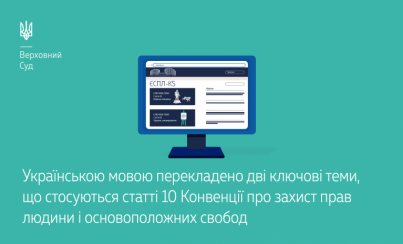Contact center of the Ukrainian Judiciary 044 207-35-46

We continue to inform you about new Ukrainian-language translations of materials on the case law of the European Court of Human Rights, which are being published on the ECtHR Knowledge Sharing Platform.
This time we would like to draw your attention to the translation of two particularly noteworthy Key Themes relating to Article 10 of the Convention for the Protection of Human Rights and Fundamental Freedoms.
The first Key Theme focuses on the ECtHR’s case law concerning expressive conduct. Ideas and opinions can be conveyed not only through traditional verbal communication, and the Court recognises the concept of “expressive conduct” that falls within the scope of Article 10 of the Convention.
This includes provocative actions, gestures, wearing symbolic clothing, boycotts, and other forms of activity that have an “expressive character” and are carried out for a specific purpose.
The ECtHR stresses that freedom of expression applies not only to information or ideas that are favourably received or regarded as inoffensive or neutral, but also to those that may offend, shock, or disturb. Such are the demands of pluralism, tolerance and broadmindedness without which there is no “democratic society”.
In addition to general principles, the Key Theme provides concrete examples of cases in which the Court has recognised particular conduct as “expressive” within the meaning of Article 10 of the Convention.
The Ukrainian translation of this Key Theme is available on the ECHR-KS Platform at: https://ks.echr.coe.int/documents/d/echr-ks/expressive-conduct-ukr.
The second Key Theme addresses artistic expression. Article 10 does not directly indicate that freedom of creativity is covered by its scope, but, as the ECtHR has recognised, Article 10 of the Convention does not distinguish between forms of expression.
The ECtHR recognises that the Convention protects freedom of artistic expression as it protects the freedom to receive and impart information and ideas. At the same time, it emphasises that States may interfere with freedom of expression on the grounds set out in Article 10(2) of the Convention, for example, for reasons of morality or to protect the rights of others.
The Key Theme analyses a number of cases concerning freedom of creativity and its permissible restrictions, including Müller and Others v. Switzerland, Wingrove v. the United Kingdom, Sinkova v. Ukraine, etc.
The Ukrainian translation of this Key Theme is available on the ECHR-KS Platform at: https://ks.echr.coe.int/documents/d/echr-ks/artistic-expression-ukr.